Fleurs du Mal Magazine


Or see the index
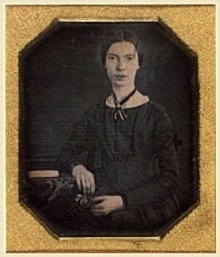
Because I could not
stop for Death
Because I could not stop for Death –
He kindly stopped for me –
The Carriage held but just Ourselves –
And Immortality.
We slowly drove – He knew no haste
And I had put away
My labor and my leisure too,
For His Civility –
We passed the School, where Children strove
At Recess – in the Ring –
We passed the Fields of Gazing Grain –
We passed the Setting Sun –
Or rather – He passed Us –
The Dews drew quivering and Chill –
For only Gossamer, my Gown –
My Tippet – only Tulle –
We paused before a House that seemed
A Swelling of the Ground –
The Roof was scarcely visible –
The Cornice – in the Ground –
Since then – ’tis Centuries – and yet
Feels shorter than the Day
I first surmised the Horses’ Heads
Were toward Eternity –
Emily Dickinson
(1830-1886)
Because I could not stop for Death
• fleursdumal.nl magazine
More in: Archive C-D, Archive E-F, Dickinson, Emily
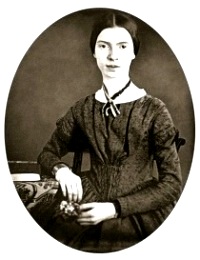
Wild nights – Wild nights!
Wild nights – Wild nights!
Were I with thee
Wild nights should be
Our luxury!
Futile – the winds –
To a Heart in port –
Done with the Compass –
Done with the Chart!
Rowing in Eden –
Ah – the Sea!
Might I but moor – tonight –
In thee!
Emily Dickinson
(1830-1886)
Wild nights – Wild nights!
• fleursdumal.nl magazine
More in: Archive C-D, Archive C-D, Dickinson, Emily

The Outlet
My river runs to thee:
Blue sea, wilt welcome me?
My river waits reply.
Oh sea, look graciously!
I’ll fetch thee brooks
From spotted nooks,—
Say, sea,
Take me!
Emily Dickinson
(1830-1886)
The Outlet, 1860
• fleursdumal.nl magazine
More in: Archive C-D, Dickinson, Emily

I’m Nobody! Who are you?
I’m Nobody! Who are you?
Are you – Nobody – too?
Then there’s a pair of us!
Don’t tell! they’d advertise – you know!
How dreary – to be – Somebody!
How public – like a Frog –
To tell one’s name – the livelong June –
To an admiring Bog!
Emily Dickinson
(1830-1886)
I’m Nobody! Who are you?
fleursdumal.nl magazine
More in: Archive C-D, Archive C-D, Dickinson, Emily
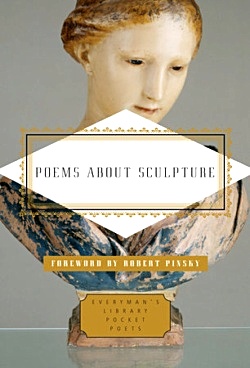 Poems About Sculpture
Poems About Sculpture
Foreword by Robert Pinsky & Edited by Murray Dewart
Poems About Sculpture is a unique anthology of poems from around the world and across the ages about our most enduring art form.
About Poems
About Sculpture
Sculpture has the longest memory of the arts: from the Paleolithic era, we find stone carvings and clay figures embedded with human longing. And poets have long been fascinated by the idea of eternity embodied by the monumental temples and fragmented statues of ancient civilizations. From Keats’s Grecian urn and Shelley’s “Ozymandias” to contemporary verse about Maya Lin’s Vietnam Veterans Memorial and Janet Echelman’s wind-borne hovering nets, the pieces in this collection convert the physical materials of the plastic arts—clay, wood, glass, marble, granite, bronze, and more—into lapidary lines of poetry. Whether the sculptures celebrated here commemorate love or war, objects or apparitions, forms human or divine, they have called forth evocative responses from a wide range of poets, including Homer, Ovid, Shakespeare, Baudelaire, Rilke, Dickinson, Yeats, Auden, and Plath. A compendium of dazzling examples of one art form reflecting on another, Poems About Sculpture is a treat for art lovers of all kinds.
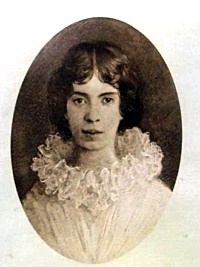
Dare You See A Soul At The White Heat?
Dare you see a Soul at the White Heat?
Then crouch within the door—
Red—is the Fire’s common tint—
But when the vivid Ore
Has vanquished Flame’s conditions,
It quivers from the Forge
Without a color, but the light
Of unanointed Blaze.
Least Village has its Blacksmith
Whose Anvil’s even ring
Stands symbol for the finer Forge
That soundless tugs—within—
Refining these impatient Ores
With Hammer, and with Blaze
Until the Designated Light
Repudiate the Forge—
Emily Dickinson
(1830 – 1886)

La Beauté
Je suis belle, ô mortels! comme un rêve de pierre,
Et mon sein, où chacun s’est meurtri tour à tour,
Est fait pour inspirer au poète un amour
Eternel et muet ainsi que la matière.
Je trône dans l’azur comme un sphinx incompris;
J’unis un coeur de neige à la blancheur des cygnes;
Je hais le mouvement qui déplace les lignes,
Et jamais je ne pleure et jamais je ne ris.
Les poètes, devant mes grandes attitudes,
Que j’ai l’air d’emprunter aux plus fiers monuments,
Consumeront leurs jours en d’austères études;
Car j’ai, pour fasciner ces dociles amants,
De purs miroirs qui font toutes choses plus belles:
Mes yeux, mes larges yeux aux clartés éternelles!
Charles Baudelaire
(1821 – 1867)
Poems About Sculpture
Foreword by Robert Pinsky
Edited by Murray Dewart
Hardcover, 256 p.
ISBN 9781101907757
Publ. by Everyman’s Library, 2016
fleursdumal.nl magazine
More in: - Book News, Art & Literature News, Baudelaire, Charles, Dickinson, Emily, Museum of Literary Treasures, POETRY ARCHIVE, Sculpture
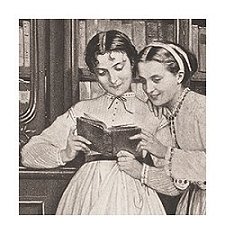
One Year ago
One Year ago — jots what?
God — spell the word! I — can’t —
Was’t Grace? Not that —
Was’t Glory? That — will do —
Spell slower — Glory —
Such Anniversary shall be —
Sometimes — not often — in Eternity —
When farther Parted, than the Common Woe —
Look — feed upon each other’s faces — so —
In doubtful meal, if it be possible
Their Banquet’s true —
I tasted — careless — then —
I did not know the Wine
Came once a World — Did you?
Oh, had you told me so —
This Thirst would blister — easier — now —
You said it hurt you — most —
Mine — was an Acorn’s Breast —
And could not know how fondness grew
In Shaggier Vest —
Perhaps — I couldn’t —
But, had you looked in —
A Giant — eye to eye with you, had been —
No Acorn — then —
So — Twelve months ago —
We breathed —
Then dropped the Air —
Which bore it best?
Was this — the patientest —
Because it was a Child, you know —
And could not value — Air?
If to be “Elder” — mean most pain —
I’m old enough, today, I’m certain — then —
As old as thee — how soon?
One — Birthday more — or Ten?
Let me — choose!
Ah, Sir, None!
Emily Dickinson
January 1, 2015
HAPPY NEW YEAR!
fleursdumal.nl magazine
More in: Archive C-D, Dickinson, Emily
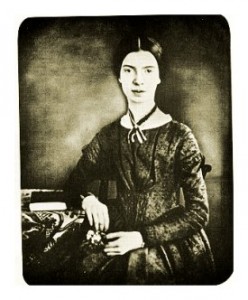
Emily Dickinson
(1830-1886)
The Martyr Poets
The Martyr Poets did not tell,
But wrought their Pang in syllable:
That, when their mortal name be numb,
Their mortal fate encourage Some.
The Martyr Painters never spoke,
Bequeathing—rather—to their Work:
That when their conscious fingers cease,
Some seek in Art the Art of Peace.
[4-voetige jambische regels, rijmschema aabb, 1 halfrijm]
De Dichter Martelaars
De Dichter Martelaars spraken niet,
Hun pijn bleek sprekend uit hun lied:
Dat men, hun naam gedood voorgoed,
Soms uit hun noodlot put voor moed.
De Schilder Martelaars, spraken nooit,
Vermaakten— veeleer—Werk voltooid;
Dat men, hun hand zijn vormkracht kwijt,
Uit Kunst, soms Vredeskunst bereidt.
Vertaling Cornelis W. Schoneveld
fleursdumal.nl magazine
More in: Archive C-D, Dickinson, Dickinson, Emily, TRANSLATION ARCHIVE
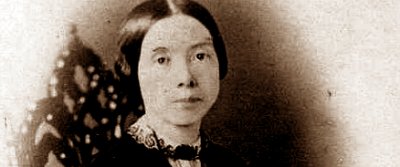
Emily Dickinson
(1830-1886)
I Died For Beauty
I died for beauty, but was scarce
Adjusted in the tomb,
When one who died for truth was lain
In an adjoining room.
He questioned softly why I failed?
“For beauty,” I replied.
“And I for truth, — the two are one;
We brethren are,” he said.
And so, as kinsmen met a night,
We talked between the rooms,
Until the moss had reached our lips,
And covered up our names.

Emily Dickinson poetry
kempis.nl poetry magazine
More in: Archive C-D, Dickinson, Emily
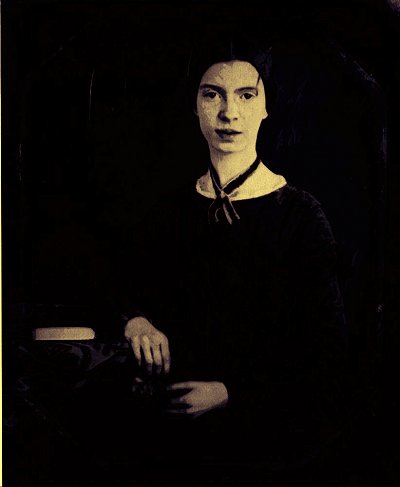
Emily Dickinson
(1830-1886)
The Last Night That She Lived
The last night that she lived,
It was a common night,
Except the dying; this to us
Made nature different.
We noticed smallest things, —
Things overlooked before,
By this great light upon our minds
Italicized, as ‘t were.
That others could exist
While she must finish quite,
A jealousy for her arose
So nearly infinite.
We waited while she passed;
It was a narrow time,
Too jostled were our souls to speak,
At length the notice came.
She mentioned, and forgot;
Then lightly as a reed
Bent to the water, shivered scarce,
Consented, and was dead.
And we, we placed the hair,
And drew the head erect;
And then an awful leisure was,
Our faith to regulate.

Emily Dickinson poetry
kempis.nl poetry magazine
More in: Archive C-D, Dickinson, Emily

Emily Dickinson
(1830-1886)
Death Is a Dialogue
Death is a dialogue between
The spirit and the dust.
“Dissolve,” says Death. The Spirit, “Sir,
I have another trust.”
Death doubts it, argues from the ground.
The Spirit turns away,
Just laying off, for evidence,
An overcoat of clay.

Emily Dickinson poetry
kempis.nl poetry magazine
More in: Archive C-D, Dickinson, Emily
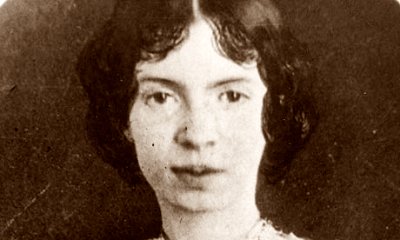
Emily Dickinson
(1830-1886)
A Train Went Through a Burial Gate
A train went through a burial gate,
A bird broke forth and sang,
And trilled, and quivered, and shook his throat
Till all the churchyard rang;
And then adjusted his little notes,
And bowed and sang again.
Doubtless, he thought it meet of him
To say good-by to men.

Emily Dickinson poetry
kempis.nl poetry magazine
More in: Dickinson, Emily
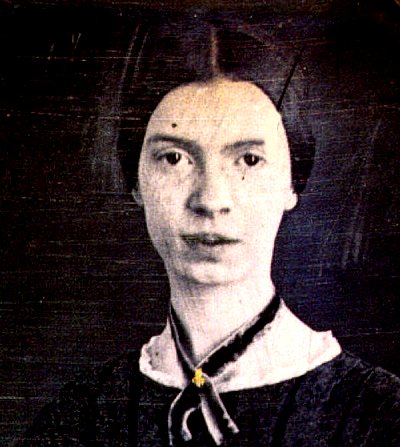
Emily Dickinson
(1830-1886)
The Great Storm Is Over
Glee! The great storm is over!
Four have recovered the land;
Forty gone down together
Into the boiling sand.
Ring, for the scant salvation!
Toll, for the bonnie souls, —
Neighbor and friend and bridegroom,
Spinning upon the shoals!
How they will tell the shipwreck
When winter shakes the door,
Till the children ask, “But the forty?
Did they come back no more?”
Then a silence suffuses the story,
And a softness the teller’s eye;
And the children no further question,
And only the waves reply.

Emily Dickinson poetry
kempis.nl poetry magazine
More in: Dickinson, Emily
Thank you for reading Fleurs du Mal - magazine for art & literature